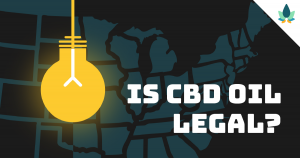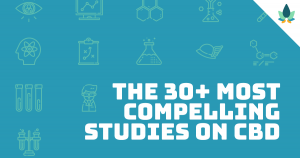Around 1 percent of the US population suffers from epilepsy, which ranges from life-altering to life-threatening.
That includes over 3 million adults, and 470,000 children (under the age of 18). (1)
At its core, epilepsy is caused by irregular nerve functions in the brain that causes a variety of symptoms, the most notable being seizures.
Its interaction with epilepsy symptoms is perhaps the most studied of all potential benefits CBD has to offer and the results of scientific and medical research are promising. They offer hope of relief to those who have traditionally had very little.
The Basics of Epilepsy Illustrate The Need For Something Better: CBD
Seizures can be classified by multiple factors, including:
- the location from which they originate
- how aware the sufferer is during the event
- features that accompany the seizure.
Based on this information, they are classified as generalized, focal onset, or unknown, with focal being the most common (the seizures originate in one part of the brain, are considered “partial”, and often have few noticeable outward symptoms) and generalized the second most common (“traditionally depicted” seizures that include a loss of motor skills, falls, and even a loss of consciousness in some cases).
The disease comes with a variety of risks, including long-term brain damage and bodily harm, drowning, depression, and more. (2)
Most commonly, the disorder is caused by:
- Brain infection
- Genetic predisposition and factors
- Head trauma
- Stroke
- Prenatal factors
Sufferers of epilepsy can experience seizures on a random basis, sometimes only once a year or less, or on a frequent basis, hundreds a week or even a day. The severity varies case to case and finding a treatment among traditional options has proven difficult… until CBD entered the scene.
CBD Shows Epilepsy Treatment Promise
Because of cannabis’ promising properties, medical marijuana became a focus as a potential epilepsy treatment. In fact, it was one of the earlier medical research applications of marijuana.
While effective for some sufferers, many reacted negatively to THC’s psychoactive qualities.
Over time, as CBD emerged as an alternative to traditional medical marijuana, researchers became interested.
Things got exciting – fast. As patients – and parents of young patients – began reporting success stories and a reduction in seizures and laws began to allow for CBD in the treatment of epilepsy in many states, in 2017, the research finally caught up. (3)
As the implications and potential behind the body’s endocannabinoid system became clearer and clearer, the role of CBD in reducing seizure activity started to make sense.
The receptors in the endocannabinoid system that interact with CBD are the CB1 and CB2 receptors, both common within the central nervous system and the immune system. These receptors – designed to react to cannabinoids, like CBD – help control the way synapses in the brain transmit, and, most importantly for epilepsy sufferers, regulate the rate at which neurons in the brain actually fire.
Research has shown that endocannabinoid receptors – when activated by CBD – interact with the central nervous system and activate GABA, which, in turn, inhibits overactive synapse firing, reducing seizure activity.
Why It Works: The Science Behind Epilepsy
While epilepsy has been around for centuries, much like in the “older” times, when patients were encouraged to drink the blood of gladiators to seek a cure, there’s a lot that remains unknown when it comes to the disorder. (4)
What we know, is that seizures are generally triggered by altered or otherwise abnormal impulses- electrochemical in nature – that affect other neurons, muscles and even glands, to cause a reaction that affects the sufferer in a wide range of possible ways. (5)

Instead of normal activity, expected in the neurons of a “normal” brain, in epileptics, the activity is disturbed, causing the side effects listed above, changing emotions, bodily control, behavior and more.
When a seizure does occur, the neurons in the patient’s brain fire at unfathomable rates, sometimes up to 500 times each and every second (in a “normally” functioning brain, the average rate is around 80 per second). Because CBD can help regulate these impulses, the potential for relief is great!
Researchers continue to search for the definite players in the epilepsy battle, but, one that seems to be most influential, is the gamma-aminobutyric acid -GABA- transmitter, which is designed to inhibit certain actions and reactions throughout the body. (6)
By altering the amount of GABA an epileptic’s brain produces, reducing seizures and other epileptic activity becomes possible, which, has led to the development of the many drugs currently prescribed for epilepsy patients.
Epilepsy Drugs And Treatments Fall Short
Unfortunately, until CBD, many of these more traditional options fell short. The first line of treatment for most epilepsy patients is an anti-epileptic medication. With over 20 varieties, these drugs are designed to reduce seizure frequency, though 30-40 percent of patients continue to experience seizures with treatment. (7)
Other options include:
- Surgery
- Electrical nerve stimulation
- Dietary changes
ANTI-EPILEPTIC MEDICATIONS are often accompanied by various side effects, that often include:

- Drowsiness
- Weight loss
- Loss of coordination
- Mood changes
- Loss of balance
- Blood count imbalances
- Skin rashes
- Liver toxicity
- Kidney stones
- Hair loss
- And more.
Because of these side effects, many patients discontinue usage of medications after approximately two years. (8)
The Results of CBD as an Epilepsy Treatment
In contrast to standard treatments and because it is able to reduce seizure activity with few side effects, CBD has become a treatment of choice for many patients.
In one study, patients who added CBD to their treatment regimen experienced 39 percent fewer seizures than those who received the placebo. (9)
Another review of multiple studies found that further research was warranted based on favorable results, low side effects and potential for addiction, and a direct correlation between CBD and a reduced number of seizures. (10)
Many studies have started to demonstrate the same promising results, moving researchers – and legislators – forward into new territories and directions.
The results have been so promising that for the first time in history, on June 25, 2018, the FDA approved a CBD-based drug, EPIDIOLEX, as a treatment option for two forms of epilepsy in patients aged two and over. (11)
This landmark action may be the beginning of many more. For epilepsy patients looking for a better, more natural option, CBD may just be the answer.










